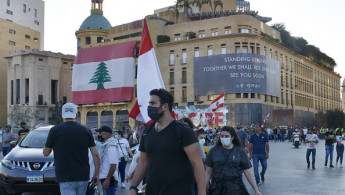IMF visits Lebanon as government tries to unlock badly needed aid
The IMF on Friday concluded the first half of a two-week visit to Lebanon as it negotiates with the Lebanese government to come up with economic reforms to unlock badly needed international aid.
IMF Spokesperson Gerry Rice said on Thursday that negotiations with Lebanon are progressing.
“We hope that we will be able to achieve this,” Rice said.
Lebanon and the IMF have been engaged in on-and-off-again talks since May 2020. The talks are aiming to hammer out reforms that if passed, would give Lebanon access to badly needed financial aid.
Lebanon has been experiencing a severe financial crisis – dubbed by the World Bank as one of the world's worst financial crises in the last 150 years – since its banking sector imploded in 2019.
In December, the government finally issued an estimate for the scale of financial losses incurred during the financial crisis, the first step towards unlocking international aid.
Despite the issuance of the loss figure and the IMF visit, analysts have cast doubt that Lebanon will see any substantial movement on the IMF file prior to the country’s 15 May elections.
“The question is, are they ready to implement adopt those reforms? Before the elections, I’m sure they are not,” Karim Daher, the head of the Committee for Depositors’ Rights at the Beirut Bar Association, told The New Arab.
“These reforms will involve severe measures, and those measures are unpopular. If they ever adopt them – including the capital control law – they will lose votes,” Daher said.
The government will be in a stronger position to pass reforms after an election due to a renewed popular mandate, he added.
As negotiations plod along, the Lebanese government has attempted to push through reforms of its own separate from the IMF.
This week, Lebanon’s parliament tried and failed to pass a capital control law, its latest attempt in a two year-struggle to adopt such controls.
A capital control law would regulate the informal capital controls put in place by the banks after the financial crisis of fall 2019, which are currently unsupervised by the state.
A leaked version of the capital control law seen by The New Arab would have established a banking committee composed of the Ministers of Finance and Economy, Prime Minister and Central Bank Governor.
The proposed measure prompted an outcry, with the Lebanese Depositors’ Union saying that such a committee would “usurp the legislative, judicial and monetary authorities” by giving them unchecked powers over the financial sector.
Previous versions of the law have similarly been met with popular outrage for perceptions of discriminating against small and medium-size depositors.
“Through this capital control law, the [government] will allow the cash economy will stay. This will allow them to continue to push towards the parallel economy. While the IMF will eventually will try to control this cash economy,” Jean Tawile, a former advisor to Lebanon’s Ministry of Economy and Trade and president of the Kataeb Economic and Social Council, told The New Arab.
He further added that any attempt to pass a capital control law should be part of comprehensive reform for Lebanon’s economy. Similarly, the IMF has said in past statements that it wants reforms to tackle the deep-rooted corruption that has typified Lebanon’s political and economic system for years.
Over $11 billion in aid has already been promised to Lebanon through international donor conferences, but the aid will not be released until Lebanon makes these reforms.
Over two-thirds of Lebanese are mired in poverty, double the pre-crisis rate.
Virtually no public good in Lebanon is functional, with the healthcare sector failing and the power grid giving less than three hours of power a day.
Despite an ambitious plan upon taking office, Lebanon’s current government under PM Najib Mikati has done little in terms of policy besides the lifting of subsidies on basic goods.





 Follow the Middle East's top stories in English at The New Arab on Google News
Follow the Middle East's top stories in English at The New Arab on Google News
![The UAE is widely suspected of arming the RSF militia [Getty]](/sites/default/files/styles/image_330x185/public/2024-11/GettyImages-472529908.jpg?h=69f2b9d0&itok=Yauw3YTG)
![Netanyahu furiously denounced the ICC [Getty]](/sites/default/files/styles/image_330x185/public/2024-11/GettyImages-2169352575.jpg?h=199d8c1f&itok=-vRiruf5)
![Both Hamas and the Palestinian Authority welcomed the ICC arrest warrants [Getty]](/sites/default/files/styles/image_330x185/public/2024-11/GettyImages-2178351173.jpg?h=199d8c1f&itok=TV858iVg)